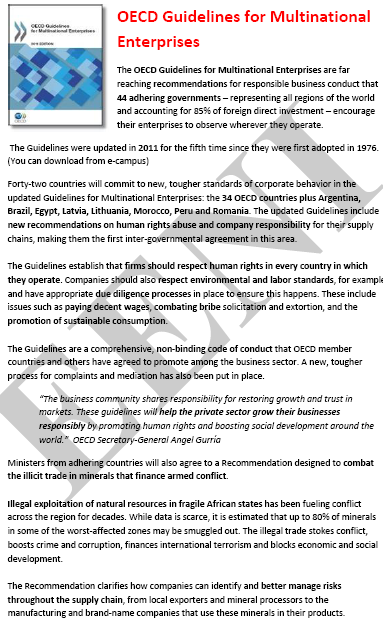OECD anti-corruption measures
OECD Guidelines for Multinational Enterprises. Bribery in Business

No to Corruption in International Business
OECD Convention on Combating Bribery of Foreign Public Officials in International Business Transactions entered into force in 1999 and had been signed by Argentina, Brazil, Bulgaria, and South Africa and all OECD countries (Australia, Austria, Belgium, Canada, Colombia, Chile, Czech Republic, Denmark, Estonia, Finland, France, Germany, Greece, Hungary, Iceland, Ireland, Italy, Israel, Japan, Latvia, Lithuania, Luxembourg, Mexico, Netherlands, New Zealand, Norway, Poland, Portugal, Slovakia, Slovenia, Spain, South Korea, Sweden, Switzerland, Turkey, UK, and the United States).

- Introduction to OECD
- OECD Guidelines for Multinational companies
- Convention on Combating Bribery of Foreign Public Officials in International Business transactions (OECD)
- Tax and Crime
- Fighting corruption in the public sector
- Guidelines for managing conflict of interest in the public service
- Good Practice Guidance on Internal Controls, Ethics, and Compliance
- Bribery in the Public Procurement
- Role of intermediaries in International Business transactions
- Electronic sales suppression
- Doing Business integrity in Africa


The Subject “OECD anti-corruption measures” is included within the curriculum of the following academic programs at EENI Global Business School:
All Doctorate in International Business (DIB).
All Masters in International Business.
Languages:  (or
(or  OCDE Anti Corrupción
OCDE Anti Corrupción  OCDE Anti Corruption). Summary in German - Italian - Arabic - Chinese - Russian.
OCDE Anti Corruption). Summary in German - Italian - Arabic - Chinese - Russian.
OECD anti-corruption measures
The mission of the Organization for Economic Cooperation and Development is to promote the policies that will improve the economic and social well-being of the people around the world.
One of the activities of OECD is the struggle against corruption.
- Colombia had acceded to the Convention on Combating Bribery (January 19, 2013)
This Convention seeks to eliminate and penalize those enterprises or people who are related to some gratification to a public official in Foreign Trade operations.
The Organization for Economic Cooperation and Development also produces a series of recommendations for both multinationals and governments (accounting for 85% of Foreign Direct Investment): OECD Guidelines for Multinational Enterprises.

(c) EENI Global Business School (1995-2025)
Top of this page











 WhatsApp
WhatsApp